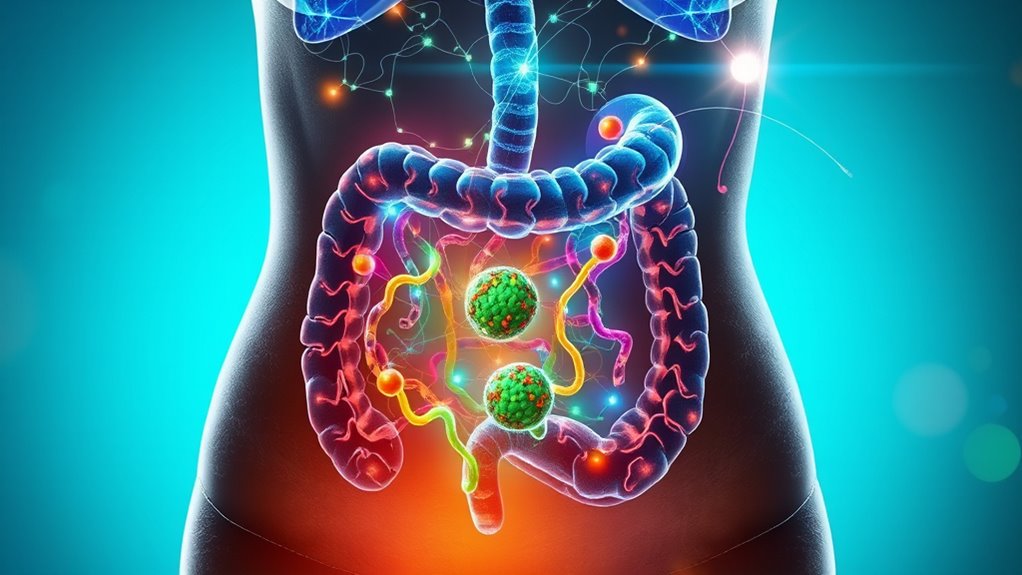As a woman over 40, you should know that a healthy gut is essential for brain function and mood, especially during hormonal changes like menopause. Your gut microbiota produce mood-boosting neurotransmitters and influence inflammation and nervous system health. As you age, diversity in your gut bacteria may decline, weakening your defenses against mood disorders. Maintaining balance through nutrition, probiotics, and lifestyle choices can support your mental well-being—there’s much more to uncover about how to optimize your gut-brain connection.
Key Takeaways
- Maintaining a diverse gut microbiome supports neurotransmitter production, essential for mood and cognitive health in women over 40.
- Aging reduces microbiome diversity, weakening gut barriers and increasing inflammation that can impact brain function.
- Gut microbes influence serotonin levels, affecting emotional well-being and mental clarity in women over 40.
- Vagus nerve signaling and microbial metabolites play vital roles in the gut-brain connection, supporting mental health.
- Probiotics and healthy lifestyle choices can help preserve microbiome diversity, enhancing overall brain health with age.
Understanding the Gut-Brain Axis

The gut-brain axis is a complex communication network that links your gastrointestinal system with your central nervous system. Your gut microbiota, the trillions of bacteria living in your digestive tract, play a critical role in this connection. They produce neurotransmitters like serotonin, which can influence your mood and brain activity. Microbial metabolites, such as short-chain fatty acids, enter your bloodstream and impact your nervous system. Changes in your microbiome composition are linked to conditions like depression and neurodegeneration, highlighting its significance for brain health. Additionally, your immune system acts as a messenger, with gut microbes modulating immune responses that can affect your brain. Maintaining a balanced microbiome supports the production of essential neurotransmitters, which are vital for optimal brain function. Recent research also suggests that microbial diversity is crucial for preventing dysbiosis and supporting overall mental health. Promoting mindfulness and stress reduction techniques can positively influence gut health by lowering inflammation and supporting microbial balance. Supporting gut barrier integrity can further prevent systemic inflammation that negatively impacts brain health. Overall, maintaining a healthy gut microbiome is essential for supporting ideal brain function and emotional well-being.
How the Gut Communicates With the Brain

Neural pathways play a central role in how your gut communicates with your brain, with the vagus nerve serving as the primary highway for this exchange. It transmits sensory information from your gut to your brain, allowing you to feel hunger, fullness, or discomfort. The enteric nervous system, containing more nerve cells than most parts of your body outside the brain, enables extensive signaling that regulates digestion, blood flow, and mood. Your brain can influence gut functions and microbiota composition through autonomic outputs. Disruptions in this communication link have been tied to anxiety and mood disorders. This complex neural messaging ensures your gut and brain stay in constant dialogue, affecting both physical health and emotional well-being—especially important as you age. Regular stimulation of the vagus nerve may help improve this communication pathway and support overall health. Understanding the role of neural pathways highlights how vital the connection between your gut and brain truly is. Moreover, maintaining healthy neural signaling can be crucial for managing age-related health changes. For example, research suggests that gut-brain communication can influence mood and cognitive function, emphasizing its importance in overall well-being.
The Role of Microbiota in Mental Well-Being

Your gut microbiota actively influences your mental well-being by producing and regulating key neurotransmitters like serotonin, dopamine, and glutamate, which are essential for mood, cognition, and immune function. Microbes affect tryptophan metabolism, impacting pathways linked to mood regulation, while microbial production of neuroactive compounds influences neuroendocrine functions. When your microbiota is imbalanced, neurotransmission can be disrupted, increasing the risk of anxiety and depression. Probiotics can help by modifying neurotransmitter levels, mimicking some effects of psychiatric medications. Additionally, gut dysbiosis often triggers systemic and neuroinflammation, which are linked to mental health issues. By supporting a healthy microbiome through diet and probiotics, you can reduce inflammation and promote a more stable mood, enhancing your overall mental well-being. Moreover, maintaining a balanced microbiota is crucial for WWE Raw’s financial impact, as a healthy gut can influence overall resilience and stress management, indirectly supporting mental health. Recent studies also highlight the growing role of AI-driven security systems in protecting sensitive health data related to mental health treatments. Furthermore, consuming fiber-rich foods can foster beneficial bacteria growth, contributing to better mental health outcomes. Additionally, the production of short-chain fatty acids by gut bacteria plays a significant role in modulating brain functions and neuroinflammation.
Changes in Gut Microbiome With Age

As you age, your gut microbiome undergoes notable changes, often showing a decline in microbial diversity. Hormonal shifts and metabolic changes influence the composition of beneficial and harmful bacteria, affecting your overall health. Understanding these shifts can help you find ways to support a balanced microbiome as you grow older.
Microbial Diversity Decline
With age, especially after menopause, women often experience a notable decline in gut microbial diversity. This decrease means fewer beneficial bacteria, weakening your gut’s defenses. As diversity drops, your gut becomes more similar to the less resilient male microbiome. You become more vulnerable to harmful bacteria like Salmonella and Klebsiella. A less diverse microbiome can:
- Reduce your gut’s ability to fight infections
- Impair barrier function, increasing microbial translocation
- Lower beneficial bacteria like lactic acid producers
- Contribute to systemic inflammation and health issues
- Alter gut resilience, making recovery from illnesses more difficult. Furthermore, changes in diet and lifestyle with age can accelerate this decline if not managed proactively, emphasizing the importance of microbial diversity in maintaining overall health.
These changes are connected to falling estrogen levels, which help regulate gut health. As microbial diversity declines, your immune response weakens, and symptoms like fatigue and digestive problems may worsen, highlighting the importance of maintaining a diverse gut microbiome for overall health.
Hormonal Influence Shifts
Menopause triggers significant hormonal shifts that profoundly affect your gut microbiome. As estrogen and progesterone levels decline, your gut barrier may weaken, leading to increased permeability and immune activation. You might notice higher levels of markers like IFAB and sCD14, signaling gut epithelial dysfunction. These hormonal changes also cause the composition of your microbiome to shift, making it more similar to that of men in certain aspects. Beneficial bacteria such as Akkermansia muciniphila and Clostridium lactatifermentans become depleted, while microbial functions like sulfate transport increase. Additionally, your microbiome’s ability to metabolize hormones, especially estrogen, may diminish, potentially influencing hormone retention and systemic inflammation. These shifts can contribute to increased health risks, including cardiometabolic issues and chronic inflammation. Moreover, gut microbiome diversity may decrease, further impairing gut health and overall well-being. Changes in microbiome diversity can also impact immune system regulation, leading to increased susceptibility to infections and autoimmune conditions. Furthermore, the altered microbial composition can influence metabolic processes, affecting energy balance and weight management during this stage of life.
Menopause and Its Effects on Gut Diversity

Menopause triggers notable changes in the gut microbiome, leading to a significant decrease in microbial diversity compared to premenopausal women. This shift makes your gut resemble that of men, reducing resilience to pathogens and impairing its ability to support overall health. As diversity drops, beneficial bacteria populations decline, weakening the gut barrier and immune defenses. You may also experience a decrease in bacteria involved in estrogen metabolism, affecting hormone recycling and systemic hormone levels. These changes can increase gut permeability, potentially causing inflammation and disrupting metabolic and inflammatory pathways. Incorporating a modern toilet in your bathroom can promote better hygiene and support a healthier gut environment. Additionally, understanding the importance of gut diversity can help guide targeted strategies to restore microbial balance and improve overall well-being. Recognizing the role of microbial diversity is crucial, as it influences not only gut health but also systemic health and hormonal regulation. Improving gut health through diet and lifestyle changes can further support hormonal balance and overall vitality. Enhancing sound design techniques in educational content can also improve engagement and understanding of complex health topics.
Hormonal Shifts Impacting Gut Health

Hormonal shifts, especially declines in estrogen, directly influence the composition of your gut microbiome. As estrogen levels drop, you may notice decreased diversity of gut bacteria, which can upset the balance between “good” and “bad” bacteria. This imbalance often leads to gut dysbiosis, making you more prone to gastrointestinal symptoms like bloating, gas, and irregular bowel habits during menopause or perimenopause. Estrogen plays a key role in supporting microbial stability; higher levels promote a healthy, diverse microbiome, while lower levels can encourage overgrowth of harmful bacteria. Additionally, your gut bacteria can influence circulating estrogen through metabolism and recirculation processes. These hormonal shifts not only affect your gut health but can also worsen hormone-related symptoms, impacting your overall well-being. Supporting organic seed cultivation practices can help improve your gut health by promoting a healthy microbiome and reducing exposure to harmful chemicals. Engaging in a diet rich in fiber and probiotics can further support microbial diversity and overall gut function.
Gut Barrier Function and Its Importance

The gut barrier serves as a critical gatekeeper, safeguarding your internal environment from harmful substances while allowing essential nutrients to pass through. It’s made up of biological, physical, and immune components working together to keep your gut healthy. This barrier separates your bloodstream from bacteria, toxins, and antigens, preventing their uncontrolled entry. When functioning properly, it supports nutrient absorption and immune balance. But if it weakens, a condition called leaky gut can develop, letting microbial products like LPS into your circulation, fueling inflammation and metabolic issues. To maintain its integrity, consider how these factors influence your gut barrier:
The gut barrier protects against toxins while facilitating nutrient absorption and immune balance.
- Healthy microbiota produce SCFAs that strengthen mucus and antimicrobial defenses
- Tight junction proteins regulate what passes through epithelial cells
- Secretory IgA neutralizes pathogens without overactivating immune responses
- Mucus layers keep bacteria separated from epithelial cells
Microbial Translocation and Immune Activation

Microbial translocation occurs when microbial products such as LPS cross the intestinal barrier and enter your bloodstream, triggering immune responses. This process activates your immune system, leading to increased production of inflammatory cytokines like TNF-α, IL-6, and IFN-γ. Continuous exposure stimulates monocytes, macrophages, and T cells, causing systemic immune activation. Over time, this persistent activation can result in immune exhaustion or dysregulation, impairing your body’s defenses. For women over 40, aging and hormonal changes may worsen gut permeability, increasing translocation and inflammation. This heightened immune response contributes to inflammaging, metabolic issues, and cognitive decline. Managing gut health can help reduce microbial translocation, supporting healthier immune function and brain health.
| Microbial Products | Immune Response |
|---|---|
| LPS (Lipopolysaccharide) | Activates cytokine production |
| Microbial components | Stimulate innate and adaptive immunity |
| Translocation | Triggers systemic inflammation |
| Chronic exposure | Causes immune dysregulation |
| Immune activation | Contributes to disease progression |
Markers Indicating Gut Permeability

To understand gut permeability, you need to look at specific biomarkers like FABP2, LBP, and zonulin, which signal barrier disruption. Hormonal changes, especially during menopause, can influence these markers and affect gut integrity. Recognizing these indicators helps you assess gut health and its potential impact on overall well-being.
Key Biomarkers of Permeability
Understanding key biomarkers of permeability helps you assess gut barrier integrity and identify underlying issues. These markers reveal how well your gut lining functions and whether damage or inflammation is present. For example:
- FABP2 indicates enterocyte damage and increased permeability, especially relevant for postmenopausal women, and can be measured noninvasively in plasma.
- LPS-binding proteins like LBP and sCD14 reflect microbial translocation and immune activation caused by a leaky gut.
- Fecal zonulin signals disruption of tight junctions, particularly in overweight or metabolically stressed individuals.
- Biomarker variability suggests that using a panel of markers provides a clearer picture of gut health, helping you pinpoint specific issues influencing systemic inflammation and overall well-being.
Hormonal Impact on Gut
Hormonal fluctuations, particularly declines in estrogen and progesterone during menopause, directly influence gut permeability and overall gut health. Reduced estrogen weakens the gut barrier by lowering tight junction proteins, allowing toxins and pathogens to enter the bloodstream, leading to systemic inflammation. Progesterone’s decline impairs immune regulation, exacerbating gut barrier dysfunction and increasing susceptibility to inflammation. These hormonal shifts also alter the gut microbiome, shifting the balance between “good” and “bad” bacteria, which can further compromise gut integrity. As gut permeability increases, microbial products like lipopolysaccharides (LPS) can leak into circulation, triggering immune responses and systemic inflammation. Monitoring markers such as endotoxin levels and inflammatory cytokines can provide insight into gut permeability issues linked to hormonal changes during and after menopause.
Inflammation and Long-Term Health Risks

Chronic inflammation plays a significant role in shaping your long-term health risks, as its persistent presence can lead to serious diseases that threaten your life years down the line. When inflammation lingers, it increases your chances of developing conditions like heart disease, cancer, diabetes, and respiratory issues. This inflammation can weaken your immune system and damage blood vessels, raising your risk of stroke and heart attacks.
- It accelerates disease progression and complicates treatment.
- Socioeconomic stressors can amplify inflammation, worsening outcomes.
- Long-term inflammation causes DNA damage, increasing cancer risk.
- Persistent inflammation can lead to immune system dysfunction, leaving you vulnerable.
Managing inflammation through lifestyle choices is vital to lowering these long-term risks and protecting your health for years to come.
The Connection Between Gut Health and Mood

Persistent inflammation can impact more than just physical health; it also influences your mood and mental well-being. Your gut and brain communicate through the vagus nerve, affecting emotions and behavior. The gut produces most of your serotonin, a key mood regulator, and imbalances can send signals that trigger anxiety or depression. When your gut microbiota is diverse and balanced, it supports stable mood by producing neurotransmitters like serotonin and GABA. Conversely, poor diet or dysbiosis can disrupt this communication, increasing mental health risks. Maintaining gut health through fiber-rich foods, fermented products, and probiotics can help stabilize your mood. Here’s a quick overview:
| Aspect | Impact on Mood |
|---|---|
| Gut-Brain Axis | Bidirectional communication influences emotions |
| Serotonin Production | 90% of serotonin made in gut, affects mood |
| Microbiota Balance | Supports neurotransmitter synthesis |
| Diet | Modulates microbiome, impacting mood |
| Dysbiosis | Linked to anxiety and depression |
Gut Microbiota’s Influence on Neurotransmitter Production

Gut microbiota play a a pivotal role in shaping your brain’s chemistry by regulating the production and breakdown of key neurotransmitters. They influence the synthesis of serotonin, GABA, and glutamate, which are essential for mood, cognition, and overall brain health. Gut bacteria also control pathways that produce or degrade these chemicals, affecting their levels in your system. Additionally, microbes metabolize tryptophan, a serotonin precursor, impacting mood and mental clarity. They produce neuroactive peptides like peptide YY and ghrelin, which communicate with your brain via the vagus nerve. By modulating enzyme activity and circulating signals, your gut microbiota help maintain neurotransmitter balance. This intricate system underscores how a healthy microbiome supports ideal brain function, especially for women over 40 seeking mental clarity and emotional resilience.
- Produce and degrade neurotransmitters like serotonin and GABA
- Metabolize precursors such as tryptophan affecting mood
- Generate neuroactive peptides that communicate with your brain
- Influence enzyme pathways critical for neurotransmitter balance
Mood Disorders and Gut Health in Women Over 40

As hormonal shifts during and after menopause affect your gut microbiome, you may notice changes in your mood and anxiety levels. These microbiome imbalances can influence neurotransmitter production and immune responses, impacting how you feel. Understanding this connection can help you find targeted strategies to support your mental health.
Hormonal Shifts and Mood
Hormonal shifts during perimenopause and menopause markedly impact mood regulation in women over 40, often leading to increased psychological distress. Fluctuating estrogen levels disrupt neurotransmitter balance, especially serotonin, which helps regulate mood. This hormonal variability can trigger new-onset mood disorders and intensify existing ones, with severity rising during late perimenopause and menopause. If you have a history of depression, your risk of experiencing major depression increases fivefold during this time.
Key points to consider:
- Estrogen supports neurotransmitter production, influencing mood stability
- Fluctuations disrupt serotonin and other mood-regulating chemicals
- Mood symptoms like irritability and low energy are common
- Past depression history heightens vulnerability during hormonal shifts
Microbiome’s Role in Anxiety
Hormonal fluctuations during perimenopause and menopause can considerably influence not just mood but also the composition of your gut microbiome. Your microbiome communicates with your brain through the gut-brain axis, affecting mood and anxiety regulation. Lower diversity in your gut bacteria is linked to higher anxiety and mood disorder risk, especially during this stage. Overgrowth of bacteria like Bacteroides and Alistipes is associated with increased anxiety, while a decline in beneficial strains such as Firmicutes and Ruminococcus reduces nutrient absorption and short-chain fatty acid production, impacting brain health. Dysbiosis can trigger inflammation and toxin release, further destabilizing your mood. Understanding these microbial shifts highlights the importance of supporting your gut health to help manage anxiety and mood swings during menopause.
Brain-Gut Signatures in Food Addiction

The brain-gut-microbiome (BGM) axis plays a crucial role in food addiction by linking neural, gastrointestinal, and microbial systems that influence eating behaviors. Your gut microbes affect motivation, cravings, and reward pathways, shaping how you seek and consume food. Variations in microbiome composition can predispose you to uncontrolled eating and addiction. Key signs include:
- Microbial profiles linked to persistent food-seeking behaviors
- Presence of microbes like Blautia that may prevent addiction
- Altered dopamine signaling impacting reward responses
- Microbial markers that could serve as diagnostic tools
These signatures show that your gut bacteria are more than passive passengers—they actively influence your cravings and addiction risk. Modulating your microbiome could be a promising approach to managing food addiction and supporting healthier eating habits.
Gender Differences in Gut-Brain Communication

Gender differences markedly influence how the gut communicates with the brain, shaping mental health outcomes. Your sex modifies the connection between your gut, immune system, and brain, affecting the prevalence of psychiatric conditions. Neuroendocrine and immune interactions with the gut-brain axis differ in women and men, leading to distinct health risks. Studies show that women with conditions like inflammatory bowel disease experience higher mental health burdens linked to these differences. Additionally, sex hormones influence gut microbiota composition, affecting neuroinflammatory responses and brain health. These variations help explain gender disparities in neuropsychiatric disorders such as depression and Alzheimer’s. Understanding these sex-specific pathways can guide more personalized approaches to maintaining gut and brain health, especially after 40.
Age-Related Changes in the Microbiome

As you age, especially after menopause, your gut microbiome undergoes significant changes that can impact your overall health. The diversity of your gut bacteria peaks around age 40 and then declines, making your gut more vulnerable to infections and imbalance. You might notice a reduction in beneficial bacteria like *Bifidobacterium animalis*, which can contribute to menopausal symptoms. Additionally, gut barrier integrity weakens, increasing microbial translocation and immune activation. Metabolic shifts occur, with higher levels of short-chain fatty acids (SCFAs) and hydrogen sulfide, influencing energy, bone health, and inflammation. These changes are linked to menopausal health conditions, such as osteoporosis and menopausal syndrome, and can alter your body’s natural defenses.
- Reduced microbiome diversity increases infection risk
- Beneficial bacteria decline, affecting metabolic functions
- Gut barrier integrity decreases, promoting inflammation
- Microbial shifts influence menopausal health and symptoms
The Impact of Diet on Gut and Brain Health

Your diet plays a powerful role in shaping your gut microbiome and, in turn, influencing your brain health. What you eat can change the diversity and function of your gut bacteria, which directly affects your mood, cognition, and emotional stability. A diet high in processed foods typical of Western eating habits may reduce microbial diversity, impairing gut-brain communication. Conversely, eating more fruits, vegetables, and whole grains supports a diverse, healthy microbiome that produces beneficial metabolites like short-chain fatty acids, essential for brain function. Including healthy fats such as omega-3s from fish and nuts can help stabilize your mood and reduce inflammation. Limiting sugar and processed foods is vital, as they can disrupt gut-brain signaling and promote inflammation, negatively impacting your mental well-being.
Benefits of Probiotics and Prebiotics

Probiotics and prebiotics work together to support your gut health, offering a range of benefits that extend beyond digestion. They help restore and maintain a healthy microbiome, reducing issues like bloating, constipation, and diarrhea. For women over 40, probiotics can lower UTI risk, balance vaginal bacteria, and decrease inflammation. Prebiotics nourish beneficial bacteria, boosting gut barrier function and producing short-chain fatty acids that support both colon and brain health. Combining prebiotics with probiotics enhances their survival and effectiveness.
- Support immune function and reduce inflammation
- Promote vaginal and urinary health
- Improve gut barrier integrity
- Enhance brain-gut communication
Lifestyle Factors Supporting Gut Function

Lifestyle factors play a essential role in maintaining and enhancing gut function, especially during midlife. Managing stress is key; chronic stress disrupts your gut bacteria and increases gut permeability. Practices like mindfulness, meditation, and deep breathing can lower stress responses and support gut health. Quality sleep is equally important—poor sleep reduces microbial diversity and weakens your gut barrier, while good sleep promotes balance and decreases inflammation. Regular physical activity boosts beneficial bacteria, improves gut motility, and reduces constipation. It also enhances immune function, helping you age gracefully. Additionally, eating a diet rich in whole foods, fiber, and micronutrients supports microbial diversity and digestion. Staying hydrated and avoiding processed foods further reinforce a healthy gut environment, essential for overall health and brain function as you age.
Strategies to Enhance Gut Barrier Integrity

To strengthen your gut barrier, focus on eating fiber-rich foods that feed beneficial bacteria and support epithelial health. Adding probiotic-rich options like yogurt and fermented foods can boost the production of protective metabolites. Combining these strategies helps improve barrier integrity and promotes overall gut function.
Promote Fiber-Rich Diets
Eating a fiber-rich diet is a powerful way to strengthen your gut barrier and improve overall intestinal health. Fiber, especially microbiota-accessible carbohydrates, helps regulate immune responses and promotes healing by supporting peptide hormones like GLP-1 and GLP-2. It boosts microbiota diversity, encouraging beneficial bacteria that produce short-chain fatty acids (SCFAs) like butyrate, which energize colon cells and reduce inflammation. To maximize benefits:
- Choose soluble fibers such as oats and inulin to boost barrier function.
- Include resistant starches to promote healthy microbiota and reduce inflammation.
- Incorporate a variety of fiber sources for diverse microbial support.
- Be mindful that not all fibers have equal effects; some may not improve permeability.
A balanced, fiber-rich diet is essential for maintaining a resilient gut barrier and supporting overall health.
Incorporate Probiotic Foods
Incorporating probiotic foods into your diet is a practical way to support and strengthen your gut barrier. These foods, like yogurt, kefir, kimchi, sauerkraut, miso, and tempeh, deliver beneficial bacteria such as *Lactobacillus* and *Bifidobacterium* species. They help improve tight junctions, reduce permeability markers like zonulin and endotoxins, and modulate immune responses by lowering inflammatory cytokines. To maximize benefits, include a variety of fermented foods daily and rotate different types to diversify your gut microbiota. Always check labels for live cultures, and consider supplementing if your diet falls short. Remember, a healthier gut barrier can markedly enhance your overall health and brain function, especially as you age.
The Role of Estrogens and Progesterone in Gut Defense

Estrogens and progesterone play crucial roles in maintaining gut defense by modulating smooth muscle activity and supporting barrier integrity. Progesterone relaxes gut muscles, reducing excessive motility, while estrogen influences gut sensitivity and function. These hormones also support the gut’s protective lining, preventing toxins from entering the bloodstream.
Estrogens and progesterone support gut health by enhancing barrier function and reducing inflammation.
- Progesterone decreases inflammation, helping protect gut tissue after injury or inflammation.
- Estrogen modulates inflammatory pathways, boosting overall gut defense.
- Both hormones strengthen tight junctions, reducing “leaky gut” risk.
- Fluctuations in hormone levels during menopause can impact gut motility, permeability, and inflammation.
Understanding these hormonal effects highlights the importance of supporting hormonal balance for ideal gut health, especially as you age.
Microbiome-Based Interventions for Cognitive Health

Microbiome-based interventions like probiotics, dietary fiber, and targeted therapies show promise for supporting cognitive health. By boosting beneficial bacteria and reducing inflammation, these strategies can enhance brain function and resilience. Exploring how to optimize these approaches could open new ways to protect and improve cognition through gut health.
Probiotics for Brain Support
- Strain-specific effects influence cognitive and mood outcomes
- Gut microbiota modifications impact brain signaling pathways
- Reducing harmful bacteria correlates with better mental health
- Neuroactive compounds produced by probiotics support neural function
These insights highlight how targeted probiotic use can enhance your cognitive resilience over time.
Dietary Fiber Benefits
Consuming adequate dietary fiber offers considerable benefits for cognitive health, especially in aging women. Higher fiber intake correlates with better cognition in adults over 60, improving domains like executive function and processing speed. Long-term studies show that fiber-rich diets can markedly enhance cognition over a decade, with optimal benefits around 34 grams daily. Fiber also helps reduce dementia risk by lowering blood pressure and supporting vascular health, which maintains blood flow to the brain. It modulates gut microbiota, producing short-chain fatty acids that reduce neuroinflammation and strengthen the blood-brain barrier. A daily intake of 25-34 grams, including soluble and insoluble fibers, supports microbiome diversity and metabolic health, helping to mitigate age-related cognitive decline and promote brain resilience in women over 40.
Targeted Microbiome Therapies
Emerging research highlights the potential of targeted therapies to modulate the gut microbiome and support cognitive health, especially in women over 40. These interventions aim to restore microbial diversity and enhance brain function through personalized approaches. For example, probiotics—particularly psychobiotics—can improve cognition and reduce inflammation. Fecal microbiota transplantation (FMT) offers a promising way to transfer healthy gut bacteria, potentially reversing neuroinflammation. Combining dietary strategies with these therapies can strengthen microbiome resilience. To deepen your understanding, consider:
- Microbial diversity as a biomarker for cognitive health
- The role of SCFA-producing bacteria in brain function
- Personalized approaches based on individual microbiome profiles
- The synergy between exercise, nutrition, and microbiome therapies
These targeted therapies represent a frontier in maintaining mental acuity as you age.
The Effect of Gut Health on Cognitive Decline

Gut health plays a crucial role in cognitive decline, as evidence shows that the composition and diversity of your gut microbiota directly influence brain function. Reduced microbiota diversity links to poorer memory, decreased cognitive flexibility, and impaired executive function. Conversely, a more diverse microbiome offers neuroprotective benefits and may slow decline. Interventions like probiotics and prebiotics have improved cognition in most cases, especially in memory and attention. Gut health indicators, such as bowel movement frequency and transit time, also relate to cognitive performance, with less frequent movements linked to decline. In individuals with mild cognitive impairment, gut microbial profiles differ from healthy peers, suggesting that restoring balance could prevent progression. Ultimately, maintaining a healthy, diverse gut microbiota supports brain health and may help protect against age-related cognitive decline.
Anxiety, Stress, and the Gut Microbiome

Your gut microbiome directly influences how you handle stress and anxiety, shaping your mental health through the gut-brain axis. When your microbiota become imbalanced, it can lead to increased inflammation and heightened stress responses. Supporting your gut with healthy habits helps maintain this balance and can reduce anxiety symptoms.
Gut Microbiota and Stress
Psychological stress directly influences the composition and diversity of gut microbiota, creating a complex, bidirectional relationship that impacts overall health. When stress strikes, it can change which bacteria thrive, sometimes increasing diversity, other times diminishing it, with important health consequences. Stress activates your HPA axis and interacts with your gut-brain axis, affecting immune function and mood. You might notice these effects through shifts in gut bacteria, like changes in Proteobacteria or Verrucomicrobia levels, which are linked to stress levels. To better understand this connection, consider:
- Stress can disrupt your gut’s balance, leading to health issues
- Gut microbiota influence how your body responds to stress
- Changes in bacteria may alter immune function and mood
- Maintaining balance supports resilience against stress
Microbiome’s Role in Anxiety
Stress impacts more than just your mood; it also influences the composition of your gut microbiome, which in turn affects brain function and emotional health. When your gut bacteria become less diverse or imbalanced—a state called dysbiosis—it can increase inflammation and alter metabolic processes, both linked to heightened anxiety. Certain bacteria, like Bacteroides and Alistipes, are associated with more anxiety symptoms, while decreases in beneficial microbes such as Ruminococcus can worsen mental health. The gut microbiota also modulates neurotransmitter levels and influences the stress response, impacting how you feel emotionally. Supporting your gut health through diet, probiotics, and stress management may help reduce anxiety and improve your overall mental well-being, especially during hormonal changes like menopause.
Supporting Gut-Brain Balance
Supporting a healthy gut-brain connection involves more than just diet; it requires mindful lifestyle choices that promote microbiome balance. Managing stress, getting enough sleep, staying hydrated, and exercising regularly are essential. These habits help maintain microbial diversity and improve gut barrier function. When you reduce stress through techniques like meditation, you support your gut’s health and the gut-brain axis. Proper hydration keeps your digestive system running smoothly. Regular physical activity boosts beneficial bacteria and reduces inflammation. Additionally, prioritizing quality sleep helps regulate hormones like estrogen, which influence gut health and mental well-being. By integrating these practices, you foster a resilient microbiome, enhance neurotransmitter production, and support better mood and stress resilience. Your lifestyle choices directly impact your gut-brain harmony, especially during hormonal shifts.
Exploring Gut-Brain Axis Disruptions in Aging Women

Have you ever wondered how changes in gut health influence brain function as women age? As you get older, your gut microbiota shifts, leading to dysbiosis—an imbalance that fuels chronic inflammation, known as inflammaging. This inflammation breaks down your gut barrier, allowing harmful substances to enter your bloodstream and reach your brain. Aging also disrupts the communication pathways of the gut-brain axis, including the vagus nerve, immune signals, and microbial metabolites, which can trigger neuroinflammation. Elevated blood-brain barrier permeability lets inflammatory molecules and microbial byproducts enter your brain, increasing the risk of cognitive decline and neurodegenerative diseases like Alzheimer’s and Parkinson’s. These disruptions not only impact brain health but also contribute to mood and metabolic issues common in women over 40.
Current Research Gaps in Women’s Gut-Brain Axis

Despite growing interest in the gut-brain axis, research on women’s specific experiences remains limited, leaving significant gaps in understanding how hormonal changes influence this connection. Many studies are small-scale, making it hard to draw broad conclusions. Variability in methods and populations complicates identifying consistent patterns. We also lack mechanistic insights into how menopause-related hormonal shifts impact microbiome composition and brain health. Additionally, research on the effectiveness of microbiome-targeted interventions during menopause is sparse.
To deepen understanding, future studies should focus on:
- Larger, more diverse sample sizes
- Long-term, longitudinal data
- Standardized research protocols
- Clearer links between hormonal changes, microbiome shifts, and mental health outcomes
The Significance of Longitudinal Studies
Longitudinal studies are essential for understanding the dynamic relationship between gut health and brain function over time. They track how your gut microbiota changes with age, diet, and lifestyle, revealing patterns that snapshot studies can’t capture. These studies help you see whether gut shifts cause neurological issues or result from them, which is crucial for developing effective treatments. They also monitor how microbiome imbalances develop and whether interventions like probiotics provide lasting benefits. For women over 40, these studies support aging health models by demonstrating how gut-brain interactions evolve, especially during hormonal transitions like menopause. By following individuals over years or decades, researchers gain critical insights into the long-term impacts of gut health on cognitive decline and inflammatory processes, guiding personalized and preventive approaches.
Personalized Approaches to Gut and Brain Wellness

Personalized approaches to gut and brain wellness recognize that each individual’s microbiome, hormonal profile, and lifestyle factors are unique. By leveraging functional lab testing, you can identify specific imbalances in gut bacteria, hormones, and biomarkers relevant to women over 40. This data guides targeted dietary and supplement strategies, helping you address symptoms like bloating, fatigue, or mood swings. Tailoring your plan involves:
Every woman’s microbiome and hormones are unique—personalized testing guides targeted wellness strategies.
- Adjusting food choices based on sensitivities and gut health.
- Incorporating prebiotics and probiotics suited to your test results.
- Managing stress, sleep, and activity to support gut-brain communication.
- Supporting hormonal balance through targeted interventions.
This holistic, customized approach focuses on root causes, promoting long-term wellness instead of just masking symptoms.
The Potential of Microbiome Testing

Microbiome testing employs advanced genomic sequencing techniques to analyze the bacterial and fungal populations present in your stool or vaginal samples. This non-invasive method identifies hundreds of microbes, including those overlooked by standard tests, providing a thorough microbial profile. At-home kits make sample collection easy and accessible, allowing you to monitor your gut and vaginal health conveniently. These tests can reveal imbalances in key bacteria like Lactobacillus, which influence menopausal symptoms and overall health. Understanding your microbiome helps you identify potential issues early, guiding tailored interventions such as probiotics or dietary changes. Emerging research links microbiome shifts to brain health, mood, and cognition, especially during menopause. Personalized microbiome testing empowers you to take proactive steps toward optimizing your gut-brain connection and overall well-being.
Strategies for Maintaining Gut Health Post-Menopause

Maintaining gut health after menopause requires intentional lifestyle and dietary adjustments to support the changing body. Focus on boosting beneficial bacteria and reducing inflammation with simple steps. Increase your fiber intake through fruits, vegetables, and whole grains to promote healthy gut bacteria. Incorporate probiotics and fermented foods like yogurt or kefir to restore balance. Stay well-hydrated to keep your microbiome thriving. Avoid processed foods, which can harm gut diversity. Ensuring a balanced diet supports overall gut health and eases menopausal symptoms.
- Prioritize whole, nutrient-rich foods for ideal gut function
- Incorporate regular physical activity to improve gut motility
- Manage stress with mindfulness or meditation practices
- Maintain consistent routines for better gut regulation
The Link Between Gut Inflammation and Mental Health

Gut health directly influences mental well-being, and inflammation plays a key role in this connection. When your gut becomes inflamed, it can increase intestinal permeability, or “leaky gut,” letting bacterial toxins enter your bloodstream. These toxins trigger systemic inflammation, which can impact your brain, leading to anxiety and depression. Specific gut bacteria, like Morganella morganii, promote inflammation pathways linked to depression through unique molecular mechanisms. Inflammatory mediators and cytokines produced in the gut can cross the blood-brain barrier or signal through the vagus nerve, affecting mood and cognitive function. Chronic gut inflammation, especially in women over 40 experiencing hormonal shifts, can worsen mental health issues and contribute to cognitive decline. Addressing gut inflammation is essential for supporting mental well-being and overall brain function.
How Microbial Diversity Supports Cognitive Function

Research shows that having a diverse microbial community in your gut is linked to better cognitive function. When your microbiome is varied, it supports brain health through multiple pathways. Greater diversity is associated with improved cognitive performance, even in healthy individuals, and reduces the risk of decline as you age. A less diverse microbiome has been linked to poorer cognitive outcomes, especially in older adults. The gut-brain axis connects your microbiota to your brain via immunologic, metabolic, and endocrine pathways, with short-chain fatty acids playing a key role. To deepen your understanding:
- A diverse microbiome promotes the production of beneficial metabolites supporting brain health
- Variability in gut bacteria influences cognitive performance across populations
- Microbial diversity affects neuroinflammation and brain aging
- Maintaining diversity can potentially improve cognitive resilience over time
Practical Tips for Supporting Gut Microbiota

Supporting your gut microbiota begins with making mindful dietary choices that favor beneficial bacteria. Focus on eating whole, unprocessed foods, and increase your fiber intake through fruits, vegetables, and whole grains. These foods promote gut diversity and support a healthy microbiome. Incorporate anti-inflammatory options like fish, nuts, and leafy greens to help maintain balance. Vary your plant choices to expose your gut to different beneficial microbes. Avoid processed foods, which can harm gut health and reduce microbial diversity. Additionally, stay active with regular exercise, including walking or cycling, to boost microbial richness. Managing stress through relaxation techniques, mindfulness, or breathing exercises also supports your gut. Consider adding probiotics, prebiotics, and fermented foods like yogurt or kefir to further enhance your gut microbiota.
The Future of Microbiome Therapeutics

The future of microbiome therapeutics is poised for rapid advancement, driven by significant technological innovations and increased investment in personalized medicine. You’ll see more targeted treatments, thanks to breakthroughs in synthetic biology, phage therapy, and genomic techniques. These innovations are making therapies more precise and effective for chronic conditions like gastrointestinal disorders. As research expands, the market is projected to grow exponentially, reaching USD 3.2 billion by 2034. To benefit from these developments, consider how these trends could impact your health:
- Tailored treatments based on your unique microbiome profile
- Use of advanced diagnostics with single-cell and genomic analysis
- Development of engineered bacteria for specific gut issues
- Integration of AI to optimize therapy efficacy
These advancements promise more effective, personalized options for gut health and overall wellness.
Recognizing Symptoms of Gut Imbalance

You might notice symptoms like bloating, indigestion, or irregular bowel movements, which often signal gut imbalance. Hormonal shifts during menopause can make these issues more noticeable or intense. Recognizing these signs early helps you address underlying problems before they impact your overall health.
Hormonal Changes and Symptoms
Hormonal changes during menopause can considerably impact gut health, often leading to noticeable symptoms that signal an imbalance. As estrogen declines, it influences your gut microbiome, reducing diversity and causing bacterial shifts. This hormonal fluctuation can result in:
- Increased microbial translocation, indicating gut barrier issues
- Elevated inflammation markers like sCD14 and LBP
- Weakened gut barrier integrity, promoting inflammation
- Gut dysbiosis, worsening symptoms and nutrient absorption problems
These changes create a reciprocal relationship where hormones and gut health affect each other, impacting your overall well-being. Recognizing these signs early helps you address underlying issues and supports maintaining a healthy gut-brain axis. Addressing hormonal shifts is vital for managing gut-related symptoms and safeguarding brain health.
Digestive Discomfort Signs
Recognizing digestive discomfort signs is essential for identifying potential gut imbalances early on. You might notice abdominal bloating, which often feels like your stomach is swollen or gassy, or experience sharp or dull abdominal pain that varies in intensity. Changes in bowel habits—such as constipation, diarrhea, or irregular movements—are common indicators. Nausea and a sense of fullness can also signal digestive issues, impacting your appetite and comfort. Additionally, unexplained weight loss might occur if nutrient absorption is compromised. Watch for symptoms like acid reflux or heartburn, especially after meals, and symptoms of irritable bowel syndrome, including gas, bloating, or inconsistent bowel patterns. Recognizing these signs helps you address gut health early, preventing further complications and supporting overall well-being.
The Interplay Between Sleep, Gut, and Brain

The relationship between sleep, gut health, and brain function is a complex, bidirectional system where each component influences the others profoundly. Poor sleep can alter your gut microbiota, leading to reduced diversity and affecting emotional and cognitive health. Conversely, an imbalanced gut can disrupt sleep patterns. Your gut microbiota plays a key role in regulating sleep through the microbiome–gut–brain axis. Factors like sleep variability and quality impact gut health, while specific bacteria may influence sleep traits.
- Sleep quality enhances gut diversity, supporting overall health
- Changes in gut microbiota can cause sleep disturbances
- Certain bacteria are linked to better sleep and metabolic health
- The gut-brain axis mediates these interconnected effects
Addressing Gut-Related Mood Changes

Since the gut microbiome plays a central role in regulating mood, addressing gut-related mood changes requires understanding how diet and microbial balance influence mental health. Your diet can markedly alter your gut microbiome, affecting neurotransmitter production and inflammation, both linked to mood swings and depression. An imbalance in bacteria, such as increased *Bacteroidetes* and decreased *Firmicutes*, can disrupt the gut-brain axis, worsening mood issues. Certain bacteria produce metabolites that influence brain function, so restoring microbial balance through dietary changes—like adopting a Mediterranean diet—or probiotics can help improve your mood. Managing inflammation and supporting healthy neurotransmitter levels are essential steps. By prioritizing gut health, you can positively impact your emotional well-being and reduce mood-related challenges.
Promoting Resilience Through Gut Health

As you age, changes in your gut microbiota can influence your resilience to stress and illness. These shifts affect your gut barrier, inflammation levels, and communication with your brain, potentially weakening your ability to bounce back from challenges. Supporting a diverse microbiome helps bolster your body’s adaptive responses. To do this, consider:
- Incorporating prebiotic and probiotic-rich foods into your diet
- Increasing fiber intake to nourish beneficial microbes
- Using nutritional supplements aimed at reducing systemic inflammation
- Eating fermented foods regularly to enhance microbiota diversity
These strategies strengthen the gut-brain axis, improve immune function, and promote emotional resilience. By prioritizing gut health, you can better manage stress, support cognitive function, and maintain overall robustness as you age.
The Impact of Antibiotics and Medications

When you take antibiotics or certain medications, you can disrupt the delicate balance of your gut microbiota, which may affect your overall health. Long-term use can lead to changes in your gut bacteria that influence brain function and mood. Understanding these effects can help you make informed choices to protect your gut and mental well-being.
Antibiotics Disrupt Microbiota
Antibiotics can considerably alter your gut microbiota by decreasing its diversity and shifting its composition. Short-term use can cause a rapid drop in beneficial bacteria, reducing diversity by about 25%, and shrinking core microbial taxa from 29 to 12. These changes can last for months, weakening your gut’s resilience and function. Antibiotics also shift the balance of bacteria, decreasing helpful groups like Bifidobacteriales and Lachnospiraceae, while allowing resistant or opportunistic bacteria, such as Fusobacteriaceae, to increase. This can disrupt gut barrier integrity and metabolic processes. Be aware that antibiotics may:
- Promote antibiotic-resistant strains, increasing infection risk
- Reduce colonization resistance, making pathogens more likely
- Cause long-lasting microbiota alterations
- Potentially impact systemic health and brain function
Medications Alter Gut Balance
| Medication Type | Effect on Gut Microbiome |
|---|---|
| PPIs | Increase *Bifidobacterium dentium* and *Streptococcus salivarius* |
| NSAIDs | Varying effects, may promote inflammation |
| Metformin | Contributes to dysbiosis |
| Statins | Alter microbial balance, affect metabolism |
| Chemotherapy | Broad suppression of beneficial bacteria |
Long-term Health Risks
Long-term use of medications, especially antibiotics, can pose significant health risks by disrupting your gut microbiome. This imbalance can lead to antibiotic resistance, making infections harder to treat. It also reduces microbial diversity, affecting your overall health and increasing the risk of digestive issues, allergies, and eczema. For women over 40, prolonged antibiotic use raises the chances of developing inflammatory bowel disease (IBD) and cardiovascular problems like heart attacks and strokes. To understand these risks better, consider:
- Antibiotic resistance diminishes medication effectiveness
- Gut microbiome disruption impacts immune and metabolic health
- Increased risk of IBD and heart diseases
- Importance of probiotics and a high-fiber diet during treatment
Being mindful of medication use and supporting gut health can help mitigate long-term health effects.
Empowering Women to Take Charge of Their Gut and Brain Health

Taking charge of your gut and brain health is empowering because understanding how these systems interact allows you to make informed choices. You can support your mental clarity and mood by focusing on a balanced diet, like the DASH diet, which promotes a healthy gut microbiome. Incorporate more fiber, probiotics, and prebiotics into your meals, and cut back on processed foods to reduce inflammation. Lifestyle changes like managing stress, exercising regularly, and prioritizing sleep further strengthen your gut-brain connection. Monitoring your symptoms and getting regular health check-ups help catch issues early. Remember, your gut health influences your mental well-being, so taking proactive steps now can improve cognitive function and mood, empowering you to maintain overall health well into the future.
Frequently Asked Questions
How Do Specific Dietary Patterns Influence Gut-Brain Axis Health in Women Over 40?
You might wonder how your diet impacts your overall health. Specific dietary patterns, like eating more fiber, antioxidants, and omega-3s, support a healthy gut microbiome, which benefits your brain and mood. Avoiding processed foods helps prevent inflammation. By choosing nutrient-rich foods, you promote better gut integrity and mental well-being, especially as hormonal changes occur. Small dietary adjustments can markedly improve your gut-brain connection and cognitive health over time.
What Role Do Lifestyle Factors Like Stress and Sleep Play in Gut Microbiome Balance?
When it comes to gut health, stress and sleep are the two big players to watch. Stress can throw your gut off balance, promoting bad bacteria and inflammation, while poor sleep worsens this effect, leading to leaky gut and immune issues. You need to stay mindful of these factors, because they’re a double-edged sword. Prioritize relaxation and quality sleep to keep your microbiome thriving and your overall health on track.
Are There Personalized Microbiome Therapies Effective for Cognitive Health in Menopausal Women?
You might wonder if personalized microbiome therapies can boost cognitive health during menopause. The good news is, tailored interventions like specific probiotics, prebiotics, and dietary changes show promise in supporting brain function. By analyzing your microbiome, healthcare providers can develop targeted plans that improve gut-brain communication, reduce symptoms, and enhance mental clarity. While research is ongoing, personalized therapies hold great potential for managing menopausal cognitive challenges effectively.
How Can Gut Health Impact Medication Efficacy and Side Effects in Women Post-Menopause?
Did you know that your gut microbiome can influence medication absorption by up to 50%? When you’re post-menopausal, hormonal changes can alter your gut bacteria, affecting how your body processes drugs. This means you might experience different side effects or reduced efficacy. To improve medication outcomes, focus on maintaining a healthy gut through diet, probiotics, and fiber-rich foods, helping your body absorb and respond better to treatments.
What Are Emerging Biomarkers to Monitor Gut-Brain Health in Aging Women?
You should focus on emerging biomarkers like circulating cytokines, which indicate inflammation linked to gut-brain health. Fecal short-chain fatty acids (SCFAs) reflect microbiome changes and metabolic health. Pro-inflammatory factors in the brain and metabolic profiling also offer insights into neuroinflammation and aging. Monitoring these biomarkers early can help you tailor interventions to maintain cognitive health and prevent age-related decline effectively.
Conclusion
Did you know that nearly 70% of your immune system resides in your gut? Taking charge of your gut health can boost your mood, memory, and overall resilience, especially after 40. By nurturing your microbiome through balanced eating, mindful medication use, and self-care, you can support your brain’s well-being. Your gut is more than digestion—it’s the key to thriving mentally and emotionally at every age.









